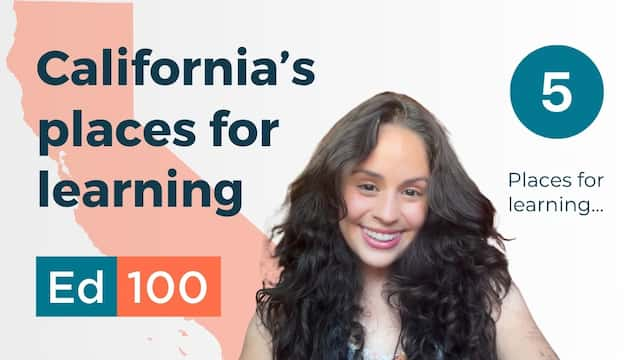
About half a million of California’s students in grades K-12 attend private schools.
In This Lesson

Are private schools religious?
How many kids go to private school in California?
Should I send my child to private school?
Are private schools better than public schools?
How much does private school cost?
Is private school tuition tax-deductible?
What is a school voucher?
Are vouchers good policy?
What is a Blaine Amendment?
▶ Watch the video summary
★ Discussion Guide
Most of these students (about 4 out of 5) attend a school affiliated with a church or religion. Private schools without a religious affiliation are often described as independent schools or nonprofit schools.
The right to private education
Parents have the right to send their kids to private schools based on a unanimous 1925 ruling of the US Supreme Court in Pierce v. Society of Sisters:
"The fundamental liberty upon which all governments in this Union repose excludes any general power of the State to standardize its children by forcing them to accept instruction from public teachers only."
Many private schools in California are Catholic schools.
Private schools enroll less than a tenth of California kids
Enrollment in private schools in California peaked in 2005 at about 600k K-12 students and nearly 9% of enrollment. The private school share of enrollment fell to 7.7% of students in 2011 but rebounded thereafter, especially during the COVID-19 pandemic, rising to 8.8% in 2022. Private schools that enroll fewer than six students are considered homeschools and excluded from the chart below. In 2022 about 47k students were enrolled in a homeschool according to affidavits filed with the California Department of Education.
Are private schools better?
Are private schools better than public ones? It's difficult to even hazard a serious guess supported by actual evidence.
Statistics about class sizes, hours of instruction, staffing and the like are not systematically collected from private schools. Simple comparisons of test scores between private schools and public ones show a difference, but this reflects a giant selection bias because kids in private schools tend to have some big life advantages. Private schools also tend to use different tests than public schools, befuddling comparisons. Accounting and tax issues make it difficult even to compare how much money private schools spend in comparison to public ones. A provocative 2018 long-term analysis by Robert C. Pianta and Arya Ansari found no evidence that private schools produce educational results broadly better than public schools when poverty and family characteristics are taken into consideration. (For a deep look at these issues, read Private Schooling in the U.S. by Bruce Bakker of Rutgers University.)
With all that said, just because the data are unclear doesn't necessarily mean there isn't a difference. People who prefer private schools for their children aren't necessarily fools. Many considerations contribute to each individual's school decision.
Tuition is not tax-deductible
In California, as in most states, private school tuition is paid by parents, generally without government support or subsidy. Private school is costly, and tuition is not generally tax-deductible.
Non-tuition donations to private school scholarship funds generally are deductible, however, as private schools are almost universally set up as non-profit organizations. Some private schools refer to themselves as "non-profit schools" to emphasize the point. Private schools depend heavily on donations to support the capital costs of buildings and the like.
What are tuition vouchers?
Tax-funded voucher programs blur the lines between private and public education by providing parents with credit toward tuition or other costs at a private school. The majority of American private schools have a religious affiliation, so debate about school vouchers frequently overlaps with arguments about separation of church and state. This question has a long history.
In 1875, under the administration of President Ulysses S. Grant, James G. Blaine proposed a constitutional ban on public funding of religious private schools. Fueled in part by a wave of anti-Catholic sentiment, the Blaine Amendment nearly became a part of the US constitution, but it narrowly failed to secure enough support for ratification. However, the separation of church and state in public education was adopted into most state constitutions, including California's.
In the 1950s and 60s, vouchers were a major mechanism for schools in the south to subvert desegregation orders.
Vouchers and the Trump administration
Debate about the use of vouchers to subsidize private schools heated up under the leadership of Betsy DeVos, the Secretary of Education in the first Trump Administration. She called on states to overturn the Blaine Amendments in their constitutions and to fund religious schools in part or in full through taxes using vouchers and other instruments. In some states, tax-funded vouchers have increasingly subsidized private education. As of 2024, Florida and Arizona had made the biggest changes in this direction.
Arguments against vouchers are succinctly summarized by the Anti-Defamation League. Rebuttals are summarized here by BalancedPolitics.org.
Opening the door for funding religious schools with taxes
In 2020, the Supreme Court considered the issue of state aid to religious schools. It held in Espinoza v Montana that once a state decides to provide support to private schools, it cannot deny the same support to religious schools. “A state need not subsidize private education,” Chief Justice Roberts wrote for the 5-4 majority. “But once a state decides to do so, it cannot disqualify some private schools solely because they are religious.”
In 2022, another ruling by the Supreme Court, Carson v. Makin, further reduced the obstacles to funding private religious schools with public funds. The bench sided 6-3 with a Maine family who challenged a state tuition program that excluded religious private schools.
California's voters have long opposed tax-based funding of private schools, rejecting initiatives in 1993, and again in 2000. Voucher advocates considered trying again to put an initiative on the ballot in 2022 but abandoned the effort.
Research about vouchers
If we set aside concerns about separation of church and state, and we forgive the historical connection between vouchers and segregation, and we decide to be OK with the fact that voucher-like programs tend to subsidize private education for wealthier families, what does research say about the impact on students? Do kids benefit?
The evidence mostly says no. From the perspective of an individual student, more options can be better than fewer options, but the big-picture finding is that subsidies for private schools are bad public policy.
Private school advocates know that the term voucher polls poorly, so it has been replaced with alternatives like choice programs, education savings accounts, or tax-credit scholarships. These all differ subtly in implementation, but with the same general effect. Changing terminology can make things so confusing that even seasoned journalists need help to keep up.
How do private school advocates respond?
In the pro-voucher arena, EdChoice is an important and well-funded advocate. The Wharton School provides voucher pros and cons with earlier state research.
An excellent (but dated) statistical comparison of private schools by their self-described affiliation (Independent, Catholic, Jewish, etc.) is available here from the blog schoolfinance101. If you know of more recent data, please contact us!
The next lesson explores ideas about improving education by incorporating health and other community-based services directly into schools.
Updated December 2024
Quiz×
CHAPTER 5:
Places For Learning
-
Places For Learning
Overview of Chapter 5 -
Where Are the Good Schools?
Zip Codes and School Quality -
School Choice
Policies for Placing Students -
Selective School Programs
How Schools Sort Students -
Continuation Schools
When Regular School Doesn't Cut It -
Charter Schools
Public Schools, Different Rules -
Private Schools
Tuition, Vouchers, and Religion -
Community Schools
Services Beyond Classwork -
Principals and Superintendents
The Pivotal Role of an Educational Leader -
School Facilities
What Should a School Look Like? -
School Climate
What Makes a School Good? -
Small Schools
Are They Better? -
Home Schools
How Do They Work? -
School Discipline and Safety
Suspensions and Other Options
Related
Sharing is caring!
Password Reset
Search all lesson and blog content here.
Login with Email
We will send your Login Link to your email
address. Click on the link and you will be
logged into Ed100. No more passwords to
remember!















Questions & Comments
To comment or reply, please sign in .
Carol Kocivar November 10, 2025 at 7:38 am
SF Chronicle tool shows the latest tuition and fees for 275 schools, plus how much the most expensive schools increased costs from last year.
Jeff Camp - Founder November 21, 2023 at 9:45 am
Carol Kocivar April 26, 2023 at 7:29 pm
The Fiscal Consequences of Private School Vouchers "
Public Funds Public Schools (“PFPS”) is a national campaign to ensure that public funds for education are used to maintain, support, and strengthen public schools. PFPS is a partnership between Education Law Center and the Southern Poverty
Law Center.
"The pattern of education spending in these seven voucher states
is unmistakable. Private school voucher programs are initially proposed as limited in size and scope, then grow as existing programs are expanded, and/or additional voucher programs are established. This results in greater and greater amounts of public funding diverted to private educational institutions and private corporations. At the same time, as noted, funding for public schools in these states has largely decreased."
https://www.splcenter.org/sites/default/files/2023-splc-pfps-report.pdf
Carol Kocivar April 26, 2023 at 5:17 pm
As of March 2023, public education advocates are tracking voucher bills in at least 24 states. As of mid-April, universal voucher bills—which will allow all families, regardless of income, to use public funds to pay for private education—have passed in four states: Iowa, Utah, Arkansas, and Florida. Meanwhile, voucher expansion bills have failed in at least six states so far in 2023: Georgia, Texas, Idaho, Virginia, Kentucky, and South Dakota.
https://www.epi.org/blog/state-and-local-experience-proves-school-vouchers-are-a-failed-policy-that-must-be-opposed-as-voucher-expansion-bills-gain-momentum-look-to-public-school-advocates-for-guidance/?mc_cid=707aad679c&mc_eid=51452a2b19
Jeff Camp - Founder December 28, 2021 at 9:49 am
Mateo Meza August 6, 2021 at 8:45 am
[email protected] Madrigal July 2, 2020 at 10:04 am
Susannah Baxendale January 25, 2019 at 4:10 pm
Jeff Camp January 29, 2019 at 5:55 pm
Carol Kocivar August 21, 2018 at 12:46 pm
A new study looks at whether private schools are better than public schools.
The finding? NOPE.
"Results from this investigation revealed that in unadjusted models, children with a history of enrollment in private schools performed better on nearly all outcomes assessed in adolescence. However, by simply controlling for the sociodemographic characteristics that selected children and families into these schools, all of the advantages of private school education were eliminated. There was also no evidence to suggest that low-income children or children enrolled in urban schools benefited more from private school enrollment."
Does Attendance in Private Schools Predict Student Outcomes at Age 15? Evidence From a Longitudinal Study
http://journals.sagepub.com/stoken/default+domain/XfYmtC25VddcCfbA3xiV/full
Carol Kocivar November 4, 2017 at 9:55 am
Carol Kocivar November 4, 2017 at 10:06 am
Angelica Manriquez February 29, 2016 at 4:10 pm
Jeff Camp - Founder October 8, 2014 at 12:07 pm
Susannah Baxendale January 25, 2019 at 4:06 pm